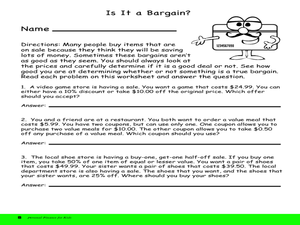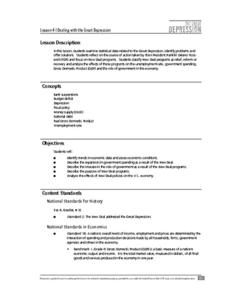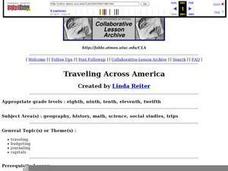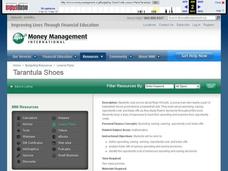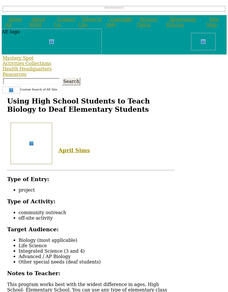Curated OER
Depression Nutrition Plan
Students plan meals for a day based on their own caloric needs, make a shopping list, and "shop" on line. In this Great Depression nutrition plan lesson, students calculate their caloric needs and plan meals before "shopping" for...
Curated OER
Checks and Balances
Students discuss elements of financial planning. In this personal finance lesson, students practice filling out personal banking information. Students conduct research using the Internet and a PowerPoint presentation to find...
Curated OER
Active Citizenship and The New Britons
Students determine some rights that citizens have and then list some responsibilities. They try to list the 5 most important rights and the 5 most important responsibilities. They try explain why they think this.
Curated OER
How Do You Spend Your Money?
Fifth graders examine ways to save and spend money. They look at ways that people earn, save, and spend money using chapters from Tom Birdseye's Tarantula Shoes. They add and subtract decimals to fill in a worksheet entitled, "Is It a...
Council for Economic Education
Balance of Payments (BOP)
Have you ever checked your clothes to see how many nations created them? Pupils take a deeper look at international trade and the balance of payments nations have with one another. They use calculations, simulations, and primary sources...
Kenan Fellows
Sensors in Chemistry
The Environmental Protection Agency monitors sensors to track air pollution and set clean air standards. Enthusiastic young scientists use similar sensors to gather data in their area and then apply the gas laws and conservation of...
Federal Reserve Bank
Turn Your Radio On
After listening to and analyzing a series of FDR's Fireside Chats, groups create their own recordings, and using New Deal programs, address a current economic condition.
Federal Reserve Bank
Dealing with the Great Depression
As part of their study of the Great Depression, young economists examine statistical data to determine the effectiveness of FDR's New Deal recovery programs.
Curated OER
Traveling Across America
Students plan a trip to a state capital of their choice with a budget of $2,000. The budgets include site seeing, lodging, food and all necessary expenses. Students keep a daily journal and maintain their budget.
Curated OER
The Odyssey
Students research and plan the routes and expenses associated in an "Odyssey" that they plan for themselves. They decide which countries they will visit and what they will see while they are there. They have a spending limit which they...
Curated OER
The Cost of War
Students view a video clip about the cost of war. They discover what goes into paying for a war. They examine the need for a budget in the government. They read a news story about this topic as well.
Curated OER
Medieval Money
Young scholars investigate the history of money as it was back then compare to now. In this algebra lesson, students analyze the type of money used in medieval times, the value of the currency and the coins used. They make a budget using...
Curated OER
Money Management Intelligence
Students follow directions to help a client with his/her budget. After selecting their client, they download confidential data and listen to the challenge presented on the website. They adjust the budgets as needed. Then, they click play...
Curated OER
Paying for Crime
Students participate in activties examining ratios and proportions. They use graphs to interpret data showing the government's budget for prisons. They present what they have learned to the class.
Curated OER
Money and health
High schoolers write a proposal with an appropriate budget to establish a health day at school. They design this day to educate and promote good health. They educate other students about health care, inform high schoolers of health...
Curated OER
Springbreak Trip
Twelfth graders plan and calculate the cost of taking a specific Spring Break trip, with a certain budget and given set costs. they determine miles traveled, gas costs, hotel expenses, etc.
Curated OER
Meet Molly An American Girl
Students examine concepts of personal finance. In this personal finance lesson, students use Valerie Tripp's, Meet Molly, An American Girl, to learn about saving and spending after World War II. They compare financial decisions after...
Curated OER
Project Whistlestop:Missouri Vacation Learning Unit
Fourth graders reserach the state of Missouri. In this Missouri History lesson, 4th graders plan a vacation to a region of Missouri. Students work in collaborative groups to determine all aspects of the trip. Students use math...
Curated OER
Moving On Up!
Young scholars complete a game-like simulation to determine a career and salary. In groups, they collect information and decide what is the "best" city in which to live. They create a monthly budget for their "best" city based on salary...
Curated OER
Stone Fox
Students use the book, Stone Fox, to explore income, capital, saving, taxes, and credit. Stone Fox tells the story of Little Willy, a ten year old who enters a challenging dog-sled race in hopes of winning money to pay the back taxes on...
Curated OER
Tarantula Shoes
Students read a book about Ryan O'Keefe, a young man who wants a pair of basketball shoes promoted by a basketball star. They explore about spending, saving, opportunity cost, and trade-offs as they study Ryan's decisions throughout the...
Curated OER
The Berenstain Bears Trouble with Money
Students will explore good and services, income and saving listening to the story The B. Bears Trouble With Money. In this early economic lesson, students discuss what it means to earn money doing services and save money to...
Curated OER
Scarcity, Choice and Decisions
Students study the basic economic trilogy (scarcity, choice, and costs). In this money management lesson, students use a scenario of a High School Prom to calculate how scarcity, choice and cost apply by completing provided worksheets...
Curated OER
Using High School Students to Teach Biology to Deaf Elementary Students
Students teach Biology concepts to elementary students, in particular deaf students, by traveling once a month to the elementary classroom with activities / lessons that have been selected and prepared by the older students.





